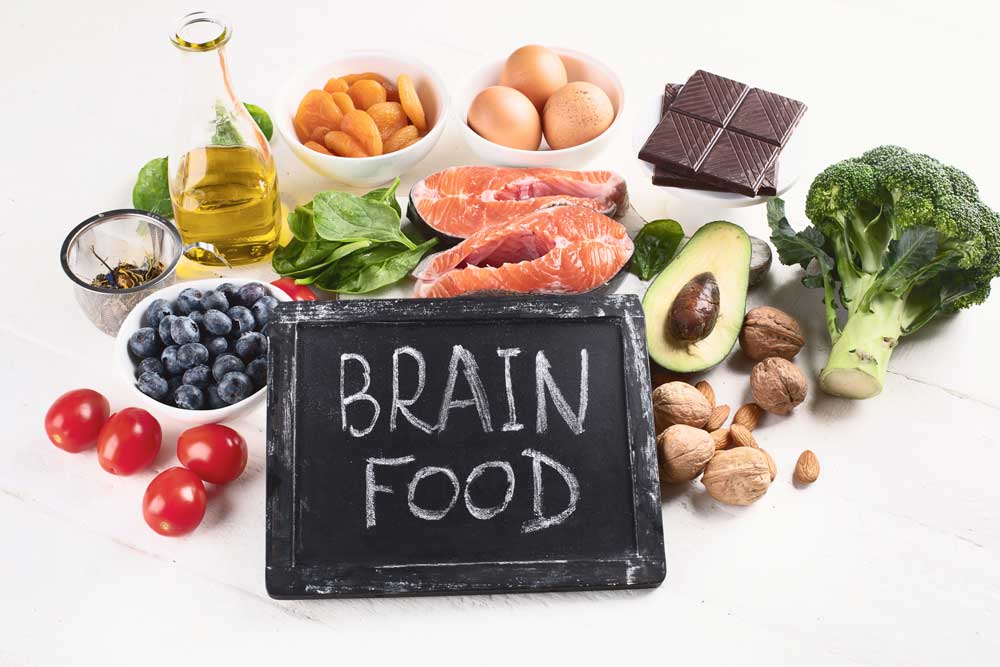In today's fast-paced world, where demands on cognitive abilities are ever-increasing, maintaining optimal brain function is paramount for both productivity and overall well-being. Our brains are the control centres of our bodies, orchestrating every thought, action, and decision we make. Therefore, ensuring that our brains receive the necessary nutrients to function at their best is crucial.
A diet rich in specific nutrients can significantly enhance cognitive abilities, improve memory and safeguard against age-related decline. The foods we consume play a pivotal role in providing these nutrients, offering a delicious and nutritious means to keep our minds sharp and healthy.
This article aims to delve into the top 12 foods scientifically proven to promote brain function. By incorporating these foods into your diet, you can provide your brain with the essential building blocks it needs to thrive. From fatty fish brimming with omega-3 fatty acids to antioxidant-rich dark chocolate, each food offers unique benefits that contribute to cognitive health.
By exploring these foods and understanding their impact on brain function, you can empower yourself to make informed dietary choices that support mental clarity, focus and overall brain health. Whether you're seeking to enhance your memory, improve concentration, or protect against cognitive decline, these foods offer a natural and effective solution to optimize brain function.
1. Food for brain function: Fatty Fish
Fatty fish such as salmon, trout, and sardines are loaded with omega-3 fatty acids, crucial for brain health. Omega-3s help build brain and nerve cells and are essential for learning and memory. They also have anti-inflammatory effects that can protect the brain from age-related decline and mental disorders.
2. Food for brain function: Coffee
Coffee is more than just a wake-up beverage; it contains caffeine and antioxidants, which are beneficial for brain function. Caffeine increases brain function by blocking adenosine, a chemical that makes you sleepy, thus boosting alertness and concentration. Additionally, coffee's antioxidants help protect the brain from oxidative stress. Moreover, coffee can enhance mood and improve overall mental performance, making it a valuable addition to your daily routine.
3. Food for brain function: Turmeric
Turmeric, the yellow spice often found in Indian curries, has a compound called curcumin that can cross the blood-brain barrier, providing direct benefits to the brain. It has powerful anti-inflammatory and antioxidant benefits, which help with brain cell growth, improve mood, and potentially delay age-related cognitive decline. Curcumin may also boost levels of brain-derived neurotrophic factor (BDNF), a type of growth hormone that functions in the brain, which is linked to improved memory and cognitive function.

4. Food for brain function: Broccoli
Broccoli is rich in antioxidants and vitamin K, which is essential for forming sphingolipids, a type of fat densely packed into brain cells. Besides its anti-inflammatory and antioxidant properties, broccoli contains compounds that can protect the brain against damage. Additionally, broccoli is high in fibre, which supports overall gut health, and a healthy gut has been linked to a healthy brain. Broccoli also contains a compound called sulforaphane, which may promote brain health by supporting the detoxification of harmful compounds and reducing oxidative stress.
5. Food for brain function: Pumpkin Seeds
Pumpkin seeds are rich in magnesium, iron, zinc, and copper, all of which are critical for brain health. Magnesium is crucial for learning and memory, while zinc and copper help nerve signalling. Iron deficiency can impair brain function, making these seeds a powerhouse of nutrients for cognitive function. Additionally, pumpkin seeds are packed with antioxidants that protect the brain from free radical damage. Regular consumption of pumpkin seeds can also help improve mood and promote better sleep, further supporting overall brain health.
6. Food for brain function: Dark Chocolate
Dark chocolate contains flavonoids, caffeine, and antioxidants. Flavonoids gather in brain areas associated with learning and memory, enhancing cognitive functions. The small amount of caffeine improves brain function by increasing alertness, while the antioxidants provide neuroprotective benefits. Additionally, dark chocolate can stimulate the production of endorphins and serotonin, which can improve mood and reduce stress. Regular consumption of dark chocolate in moderation has also been linked to improved blood flow to the brain, supporting overall cognitive health.
7. Food for brain function: Nuts
Nuts, especially walnuts, are excellent for brain health. They contain healthy fats, antioxidants, and vitamin E, which protects cell membranes from oxidative stress. Studies have shown that nuts can improve cognitive function and help prevent neurodegenerative diseases. Furthermore, nuts provide a good source of essential nutrients such as omega-3 fatty acids, which are known to support brain cell structure and function. Regular consumption of nuts has also been linked to better heart health, which in turn supports overall brain health by ensuring adequate blood flow and oxygen supply to the brain.
8. Food for brain function: Oranges
Oranges and other citrus fruits are rich in vitamin C, a key factor in preventing mental decline. Vitamin C is an antioxidant that fights off the free radicals that can damage brain cells. It also supports brain health by helping to prevent cognitive decline. Additionally, vitamin C aids in the production of neurotransmitters, which are essential for communication between brain cells. Regular consumption of oranges can also boost overall immune function, indirectly supporting brain health by keeping the body in optimal condition.
9. Food for brain function: Green Tea
Green tea contains caffeine and L-theanine, which work together to improve brain function. L-theanine can cross the blood-brain barrier and increase the activity of the neurotransmitter GABA, which helps reduce anxiety and makes you feel more relaxed, yet alert. The antioxidants in green tea also protect the brain. Moreover, regular consumption of green tea has been associated with a reduced risk of cognitive decline and may help enhance memory and attention span over time.
10. Food for brain function: Avocados
Avocados are a rich source of healthy monounsaturated fats, which promote healthy blood flow, thus boosting brain function. They are also high in vitamin K and folate, which help prevent blood clots in the brain and improve cognitive function, particularly memory and concentration. Additionally, avocados contain lutein and zeaxanthin, two antioxidants that accumulate in the brain and have been linked to improved cognitive function and a reduced risk of age-related cognitive decline. Moreover, avocados are versatile and can be easily incorporated into various dishes, making them a convenient and delicious way to support brain health.

11. Food for brain function: Blueberries
Blueberries are packed with antioxidants and anti-inflammatory compounds that help fight oxidative stress and inflammation, both of which contribute to brain aging and neurodegenerative diseases. They have been shown to improve brain function, particularly memory. Moreover, blueberries contain flavonoids called anthocyanins, which have been found to accumulate in areas of the brain associated with learning and memory, potentially enhancing cognitive function and protecting against age-related decline. Additionally, studies suggest that regular consumption of blueberries may also improve communication between brain cells, further supporting cognitive health and overall brain function.
12. Food for brain function: Eggs
Eggs are an excellent source of several nutrients tied to brain health, including vitamins B6 and B12, folate, and choline. Choline is a crucial nutrient used to produce acetylcholine, a neurotransmitter that helps regulate mood and memory. B vitamins help slow the progression of mental decline in the elderly. Additionally, eggs are a complete protein source, providing all the essential amino acids required for neurotransmitter synthesis and overall brain function. Moreover, research suggests that regular egg consumption may improve cognitive performance and memory retention in individuals of all ages.
Conclusion
In conclusion, the impact of nutrition on brain health cannot be overstated. As we've explored the top 12 foods that promote brain function, it becomes evident that what we eat directly influences our cognitive abilities, memory, and overall mental well-being.
By incorporating these brain-boosting foods into your diet, you're providing your brain with the essential nutrients it needs to thrive. From omega-3 fatty acids in fatty fish to the antioxidants in blueberries, each food offers unique benefits that contribute to optimal brain function.
However, it's essential to remember that dietary changes alone are not a panacea for brain health. A holistic approach that combines a balanced diet with regular exercise, quality sleep, stress management, and mental stimulation is key to maintaining a sharp mind and a healthy body.
In essence, by fuelling your body and mind with the right nutrients and lifestyle choices, you're laying the foundation for a sharper, more resilient brain and a happier, healthier life overall.
FAQs
How quickly will I notice improvements in my brain function after changing my diet?
Improvements can vary from person to person, but many people start to notice positive changes in cognitive function within a few weeks of consistently eating brain-boosting foods.
Are supplements as effective as eating these foods?
While supplements can help, getting nutrients from whole foods is generally more beneficial due to the synergy of the various compounds found in foods.
Can these foods help with serious cognitive conditions like Alzheimer's?
While these foods can support brain health and may reduce the risk of cognitive decline, they are not a cure for serious conditions like Alzheimer's. It's important to consult with a healthcare provider for comprehensive treatment.
How much of these foods should I eat to benefit my brain?
It's best to incorporate a variety of these foods into your diet regularly. Specific amounts can vary, but generally, eating them as part of a balanced diet will be beneficial.